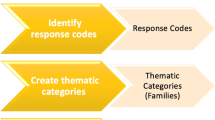Abstract
Objectives
Student mistreatment remains a prominent issue in medical education. Mistreatment has been linked to negative mental health outcomes, including depression, anxiety, and burnout. Continued challenges in this arena include difficulties in identifying mistreatment and underreporting. The objective of this study was to better understand the nuances of individual students’ reactions to mistreatment.
Methods
Medical students, who had experienced mistreatment, were invited to participate in this study. Individual, semi-structured, peer-to-peer interviews were conducted with 21 students. Interview transcriptions were coded using grounded theory and inductive analysis, and themes were extracted.
Results
The interviews generated 34 unique mistreatment incidents. Four major themes arose in students’ reactions to mistreatment. (1) Descriptions—the student described the incident as inappropriate, unusual, or unnecessary. (2) Recognition—most students did not immediately recognize the incident as mistreatment. (3) Emotions—the student described negative emotions (negative self-views, anger, powerlessness, shock, discomfort) associated with the mistreatment incident. (4) Coping mechanisms—the student utilized avoidance and rationalization to process their mistreatment.
Conclusions
Mistreatment generates complex emotions and coping mechanisms that impair the learning process. These complex emotions and coping mechanisms also make it difficult for trainees to identify mistreatment and to feel safe to report. Increasing understanding of the psychological impact of mistreatment can help peers and educators better screen for mistreatment in trainees and guide them in reporting decisions.
Similar content being viewed by others
References
Silver HK. Medical students and medical school. JAMA. 1982;247(3):309–10. https://doi.org/10.1001/jama.1982.03320280029024.
Hisashi Y, Haviland MG, Werner LS, Sabharwal RK. Recent trends in the reporting of student mistreatment. Anal Brief. 2006;6(4).
Silver HK, Glicken AD. Medical student abuse: incident, severity, and significance. JAMA. 1990;263(4):527–8. https://doi.org/10.1001/jama.1990.03440040066030.
Association of American Medical Colleges. Medical school graduation questionnaire: 2020 all schools summary report (Internet). 2020. Available from: https://www.aamc.org/media/43786/download. Accessed 10 Feb 2021.
Richman JA, Flaherty JA, Rospenda KM, Christensen ML. Mental health consequences and correlates of reported medical student abuse. JAMA. 1992;267(5):692–4. https://doi.org/10.1001/jama.1992.03480050096032.
Haglund MEM, aan het Rot M, Cooper NS, Nestadt PS, Muller D, Southwick SM, et al. Resilience in the third year of medical school: a prospective study of the associations between stressful events occurring during clinical rotations and student well-being. Acad Med. 2009;84(2):258–68. https://doi.org/10.1097/ACM.0b013e31819381b1.
Frank E, Carrera JS, Stratton T, Bickel J, Nora LM. Experiences of belittlement and harassment and their correlates among medical students in the United States: longitudinal survey. BMJ. 2006;333:682. https://doi.org/10.1136/bmj.38924.722037.7C.
Cook AF, Arora VM, Rasinski KA, Curlin FA, Yoon JD. The prevalence of medical student mistreatment and its association with burnout. Acad Med. 2014;89(5):749–54. https://doi.org/10.1097/ACM.0000000000000204.
Kassebaum DG, Cutler ER. On the culture of student abuse in medical school. Acad Med. 1998;73(11):1149–58. https://doi.org/10.1097/00001888-199811000-00011.
Haviland MG, Yamagata H, Werner LS, Zhang K, Dial TH, Sonne JL. Student mistreatment in medical school and planning a career in academic medicine. Teach Learn Med. 2011;23(3):231–7. https://doi.org/10.1080/10401334.2011.586914.
Chung MP, Thang CK, Vermillion M, Fried JM, Uijtdehaage S. Exploring medical students’ barriers to reporting mistreatment during clerkships: a qualitative study. Med Educ Online. 2018;23(1). https://doi.org/10.1080/10872981.2018.1478170.
Mazer LM, Merrell SB, Hasty BN, Stave C, Lau JN. Assessment of programs aimed to decrease or prevent mistreatment of medical trainees. JAMA Netw Open. 2018;1(3):e180870. https://doi.org/10.1001/jamanetworkopen.2018.0870.
Gan R, Snell L. When the learning environment is suboptimal: exploring medical students’ perceptions of mistreatment. Acad Med. 2014;89(4):608–17. https://doi.org/10.1097/ACM.0000000000000172.
Heru A, Gagne G, Strong D. Medical student mistreatment results in symptoms of posttraumatic stress. Acad Psychiatry. 2009;33(4):302–6. https://doi.org/10.1176/appi.ap.33.4.302.
Edmonson A. Psychological safety and learning behavior in work teams. Adm Sci Q. 1999;44(2):350–83. https://doi.org/10.2307/2666999.
Tsuei SH, Lee D, Ho C, Regehr G, Nimmon L. Exploring the construct of psychological safety in medical education. Acad Med. 2019;94(11S Association of American Medical Colleges Learn Serve Lead: Proceedings of the 58th Annual Research in Medical Education Sessions):S28–35. https://doi.org/10.1097/ACM.0000000000002897.
Torralba KD, Jose D, Byrne J. Psychological safety, the hidden curriculum, and ambiguity in medicine. Clin Rheumatol. 2020;39(3):667–71. https://doi.org/10.1007/s10067-019-04889-4.
Bynum WE, Goodie JL. Shame, guilt, and the medical learner: ignored connections and why we should care. Med Educ. 2014;48(11):1045–54. https://doi.org/10.1111/medu.12521.
Bynum WE, Haque TM. Risky business: psychological safety and the risks of learning medicine. J Grad Med Educ. 2016;8(5):780–2. https://doi.org/10.4300/JGME-D-16-00549.1.
Acknowledgments:
Thank you to Alvin Chen for assistance with RedCap and processing the codebook. Thank you to Michelle Ghebranious, Shelley Burge, Andrew Gerber, Tasia Isbell, Isabelle Mulder, Margaret O’Brien, Tiffany Robles, David Wideman, and Victoria Lehrmann for assistance with study recruitment and interview transcription. Thank you to the McGovern Medical School Office of Admissions and Student Affairs and Office of Educational Programs for their support and commitment to combating student mistreatment.
Author information
Authors and Affiliations
Corresponding author
Ethics declarations
Disclosures
On behalf of all authors, the corresponding author states that there is no conflict of interest..
Additional information
Publisher’s Note
Springer Nature remains neutral with regard to jurisdictional claims in published maps and institutional affiliations.
Rights and permissions
About this article
Cite this article
Yau, B.N., Chen, A.S., Montgomery, K.B. et al. An Internal Perspective: the Psychological Impact of Mistreatment. Acad Psychiatry 45, 308–314 (2021). https://doi.org/10.1007/s40596-021-01430-1
Received:
Accepted:
Published:
Issue Date:
DOI: https://doi.org/10.1007/s40596-021-01430-1



